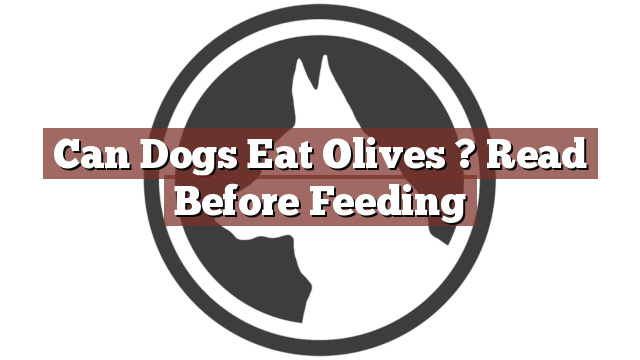Understanding Your Dog’s Dietary Needs
As a responsible dog owner, it is essential to understand your furry friend’s dietary needs. Proper nutrition plays a crucial role in maintaining a dog’s overall health and well-being. While dogs are primarily carnivores, their diet can also include some fruits and vegetables. However, not all human foods are suitable for dogs, as some can be harmful or toxic. It is important to be aware of what foods are safe and beneficial for your canine companion before incorporating them into their diet.
Can Dogs Eat Olives? Read Before Feeding
One common question that dog owners often ask is, "Can dogs eat olives?" The answer is yes, but with certain limitations. Olives themselves are not toxic to dogs, but they should be fed in moderation and prepared in the right way. It is important to note that while olives are safe for dogs to consume, not all dogs may enjoy the taste or texture of olives. Therefore, it is recommended to introduce olives gradually into your dog’s diet to observe their reaction.
Pros and Cons of Feeding Olives to Your Dog
Feeding olives to your dog can have both pros and cons. Let’s explore them in more detail:
Pros:
-
Source of Healthy Fats: Olives are rich in monounsaturated fats, which are considered healthy fats. These fats can contribute to your dog’s overall well-being and help maintain a healthy coat and skin.
-
Vitamins and Minerals: Olives contain various beneficial vitamins and minerals such as vitamin E, iron, and calcium. These nutrients can support your dog’s immune system, promote healthy bones, and aid in proper digestion.
Cons:
-
High Sodium Content: Olives, especially those that are commercially processed or canned, can be high in sodium. Excessive sodium intake can lead to health problems such as dehydration, high blood pressure, and kidney issues in dogs. Therefore, it is crucial to choose low-sodium or unsalted olives when feeding them to your dog.
-
Potential Choking Hazard: Olives have pits that can pose a choking hazard to dogs. It is essential to remove the pit before giving olives to your dog. Additionally, ensure that the olives are sliced or mashed into smaller pieces to prevent any potential choking incidents.
Conclusion: Weighing the Benefits and Risks
In conclusion, dogs can eat olives in moderation and when prepared properly. While olives offer certain health benefits like healthy fats and essential nutrients, they should be given sparingly due to their high sodium content. It is crucial to choose low-sodium olives and remove pits to ensure your dog’s safety. As with any new food, it is recommended to consult with your veterinarian before introducing olives or any other human food into your dog’s diet. Remember to always prioritize your dog’s health and well-being by providing a balanced and suitable diet for their specific needs.
Thank you for taking the time to read through our exploration of [page_title]. As every dog lover knows, our furry friends have unique dietary needs and responses, often varying from one canine to another. This is why it's paramount to approach any changes in their diet with caution and knowledge.
Before introducing any new treats or making alterations to your dog's diet based on our insights, it's crucial to consult with a veterinarian about [page_title]. Their expertise ensures that the choices you make are well-suited to your particular pet's health and well-being.
Even seemingly harmless foods can sometimes lead to allergic reactions or digestive issues, which is why monitoring your dog after introducing any new food item is essential.
The content provided here on [page_title] is crafted with care, thorough research, and a genuine love for dogs. Nevertheless, it serves as a general guideline and should not be considered a substitute for professional veterinary advice.
Always prioritize the expert insights of your veterinarian, and remember that the health and happiness of your furry companion come first.
May your journey with your pet continue to be filled with joy, love, and safe culinary adventures. Happy reading, and even happier snacking for your canine friend!

